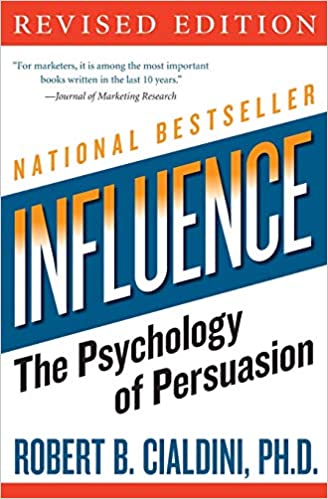Asking for professional favors can feel awkward. And if you don’t have a confident personality, you may struggle with mustering up the courage to approach a colleague or co-worker with a professional request.
However, if you go about this in the right way, it does not need to be time-consuming or complex, and a good approach raises the likelihood of people saying yes.
To help you get people to say yes to professional favors, we wanted to share some of the best ways to ask so that you get a positive result.

Influence
by Robert Cialdini
⏱ 14 minutes reading time
🎧 Audio version available
Ask for a favor in person
It is tempting to send an email, especially if you feel awkward, but approaching a co-worker in person is far more likely to lead to a positive answer.
It is easier to ignore or say no to emails than to faces. Most people will be far more likely to say yes to your proposal if you stand in front of them. People generally find it awkward to say no in person, so use this to your advantage.
Offer something in return, not as a bargaining chip but as a general philosophy
If you are generally helpful to people and do things for them, they will feel that they will need to reciprocate with kindness in return. Even people who are happy to accept freebies and will not question your apparent generosity are more likely to say yes if you have already laid the foundations for asking for a favor.
This is a long game, so always try to get on with co-workers and fellow professionals so they do the same for you when you need a favor.
Inspire trust when you are asking for a professional favor
Showing that you are a professional and credible person makes your request seem more reasonable too. So, don’t be afraid to call in some professional evidence by demonstrating experience of previous successful projects.
If your boss sees credible evidence that you know what you are talking about, they are far more likely to say yes.
Getting your boss on board can also help you approach co-workers because if they know that your organization approves your request, they are less likely to go against it.
Create a deadline for the favor
If you don’t create a deadline, the person you ask may agree to it as a vague idea in the future but may not have a genuine intention of following through.
Setting a deadline tells your co-worker that you need the favor done by a specific time or your plan will fail. This urgency creates feelings of guilt if your co-worker ignores your request, so they are far more likely to agree to help.
Building personal relationships with co-workers increase the likelihood of them agreeing to a favor
We want to please the people we like, so forming personal relationships will help them say yes. This doesn’t mean that you need to spend every lunchtime listening to them natter about their love life or sports team. Just remembering people’s names and getting along professionally is often enough to make people like you. And if they like you, they will want to help you out by agreeing to the favor.
Be upfront but polite when you ask for a favor
According to Harvard Business Review, the way you ask for the favor can drastically affect the outcome.
There are three key stages to remember:
First, set the scene by saying I have a favor to ask you.
Then, give your reason for asking.
Finally, give your co-worker an escape clause by saying you will understand if they cannot do it.
Don’t phrase your favor like a command
By asking the person if they can do you a favor, it implies that you are on a friendly basis of a two-way relationship.
The phrase, “I have a favor to ask you,” is far better than just asking for the favor without acknowledging that it is a favor.
So saying, “can you cover for me tonight as I’m running late” is not as powerful as saying, “Michael, I have a favor to ask you. Can you cover for me tonight? I’m tied up at the office, and I’m not going to be able to make it on time.”
Always give your co-worker a chance to say no
Saying you completely understand if someone can’t do the favor, but thought you’d ask anyway, is perfectly reasonable and will not harm your relationship in the future.
People cannot consistently deliver a favor just because you ask. Therefore, keeping your request free from too much pressure will help your chances of the favor being granted.
Don’t cross the line over professional boundaries
If you are friendly with a professional in any field, don’t expect them to give you free service just because you ask for a favor. Many professionals are used to people trying to use their time and expertise for freebies, so don’t do it. It crosses a line that will do you no good in the future.
Once the favor has been granted, don’t forget to show gratitude.
Always follow the favor up with a verbal thank you or a note that says how much you appreciate it. You don’t need to go on about it, or the person may become embarrassed, but acknowledging that you appreciate their favor will help them feel their effort on your behalf was worth it.
Be sparing in your favor requests
Don’t turn into one of those people who are constantly asking for a favor. This is not only annoying; it will give you a reputation that you are looking for special treatment, and people will tend to refuse on principle. Instead, save asking a favor when you need it. That way, you are far more likely to hear a yes.
What Is Snapreads?

With the Snapreads app, you get the key insights from the best nonfiction books in minutes, not hours or days. Our experts transform these books into quick, memorable, easy-to-understand insights you can read when you have the time or listen to them on the go.


